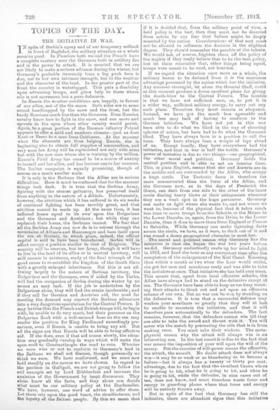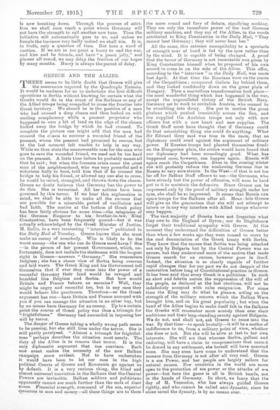TOPICS OF THE DAY
• THE INITIATIVE IN WAR.
TN spite of Serbia's agony and of our temporary setback in front of Baghdad, the military situation as a whole remains good. In Flanders both we and the French have a complete mastery over the Germans both in artillery fire and in the power to attack. It is assorted that we are not likely to make a, serious advance during the winter, but Germany's probable immunity from a big push here is due, not to her own intrinsic strength, but to the weather and the character of the land. Iu the greater part of the front the country is waterlogged. This puts a disability upon advancing troops, and gives help to those whose role is not movement but a pure defensive. In Russia the weather conditions are, happily, in favour of our allies, not of the Gei mans. Both sides are to some extent handicapped by the scow and the frost, but the hardy Russians much less than the Germans. Even Russian cavalry know how to fight in the snow, and can move and operate in the open where other cavalry would perish. Again, to a great portion of the Russian infantry Poland appears to offer a mild and southern climate—just as dues Kent or Eases to a man from Caithness. At the moment when the elements are thus helping Russia, she is beginning also to obtain full supplies of ammunition, and very soon her Array will be replenished not only with arms but with the new men whom she is training by the million. Russia's Field Army has ceased to be a, source of anxiety to herself and her allies, and has become one to her enemies. The Italian campaign is equally promising, though of course on a much smaller scale.
It is only in the Balkans that the Allies are in serious difficulties. Here it must be confessed that for the moment things look dark. It is true that the Serbian Army, ighting with the utmost gallantry, has preserved itself from anything in the nature of a debacle. Unfortunately, however, the attrition which it has suffered in its six weeks of continual fighting has been terribly great, and that attrition cannot be made up. At the same time, it has inflicted losses equal to its own' upon the Bulgarians and the Germans and Austrians ; but while they can replenish their losses, the Serbians cannot. We fear that all the Serbian Army can now do is to retreat through the mountains of Albania and Montenegro and base itself upon the sea at Scutari, to which place, indeed, the official capital is said to have been transferred. Serbia will in effect occupy a position similar to that of Belgium. The country will be overrun, but her Army, though it will have to live in the laud of its allies or in neutral territory, will still remain in existence, ready at the final triumph of the good cause to re-establish the kingdom of the South Slave with a greatly enlarged inheritance. But this is not all. Owing largely to the nature of Serbian territory, the Bulgarians and the Germans, even if aided by the Turks, will find the occupation of Serbia during the winter by no means an easy task. If the job is undertaken by the Bulgarians alone, they will find the strain intolerable ; and if they call for German and Austrian aid, the need for meeting the demand may convert the Serbian adventure into a very dangerous speculation for the Central Powers. It may be true that the French and British troops will, to begin with, be unable to do very much, but their presence on the Bulgarian flank with a well-secured base on the sea may render the position for King Ferdinand exceedingly pre- carious, even if Russia is unable to bring any aid. But all the signs are that Russia will be able to bring effective aid. If she does, even if that aid comes slowly, the situa- tion may gradually develop in ways which will make time open road to Constantinople the road to ruin. Whether we were wise or not to conform to Germany's lead in the Balkans we shall not discuss, though personally wo think we were. We have conformed, and we must now hold steadily on the course we have chosen. In regard to the position in Gallipoli, we are not going to follow the evil example set by Lord Ribblosdale and increase the anxieties of the Government by inept discussion. They alone know all the facts, and they alone can decide what must be our military policy at the Dardanelles. We have, however, one word of advice to offer them. Let them rely upon the good heart, the steadfastness, and the loyalty of the British people. By this we mean that if it is decided that, from the military point of view, a bold policy is the best, then they must not be deterred from action by any fear that failure might be deeply resented by the nation. Considerations of that sort must not be allowed to influence the decision in the slightest degree. They should remember the parable of the talents. We would not, of course, frighten them off the policy of the napkin if they really believe that to be the best policy, but let them remember that, other things beiug equal, troops were meant to be used, not hoarded.
If we regard the situation once more as a whole, the military lesson to be deduced from it is the enormous advantage possessed by the nation which has the initiative. Any amateur strategist, let alone the General Staff, could at this moment produce a dozen excellent plans for giving the death-blow to the Central Powers. The trouble is that we have not sufficient men, or, to put it in a wider way, sufficient military energy, to carry out any such plans. Therefore they must remain in abeyance. Instead, we have got the much loss agreeable and much less easy task of having to conform to the German initiative. We have not yet in this war been able to do what we liked in the way of choosing sphSres of action, but have bad to do what the Germans liked. They have always been in a position to call the tune. They have always been a couple of laps ahead of us. Except locally, they have everywhere had the initiative, and that in war is half the battle. Germany's power of initiative is due to two things—one geographical, the other moral and political. Germany holds the central position and is able to act on interior lines. This, in plain English, means that she and Austria are in the middle and are surrounded by the Allies, who occupy a huge circle. The Teutonic force is therefore far more concentrated than the force of the Allies, and time Germans now, as in the days of Frederick the Great, can dash from one side to the other of the inner circle dealing heavy blows at their antagonists wherever they see a weak spot in the huge perimeter. Germany can make us fight where she wants to, and not where we want to, because of the physical fact that it takes much less time to move troops from the Schelde or the Meuse to the Lower Danube, or, again, from time Dvina to the Lower Danube, than it does to inure them from England or France to Salonika. While Germany can make lightning darts across the circle, we have, as it were, to duck out of it and run round a dozen geographical obstacles to meet her. The moral and political reason why Germany has the initiative is that she began the war two years before we did. Germany undoubtedly made up her mind to fight in 1912, and fixed the hour as any convenient time after the completion of the enlargement of the Kiel Canal. Knowing then within a mouth or two when the hour would strike, she got her men and munitions ready and was able to take the initiative at once. That initiative she has held over since. This means that, apart from local offensive attacks, the Allies have always had to stand on the defensive except at sea. The Germans have been able to keep us too busy resist- ing their attacks to think out and act upon an offensive scheme of our own. But no war can be won by standing on the defensive. It is true that a successful defence may weaken your assailants so greatly that they will at last be unable to maintain the initiative, and that it will therefore pass automatically to the defenders. The fact remains, however, that the defenders cannot win till they are able to take the sword and thrust with it. You will never win the match by preventing time side that is in from making runs. You must take their wickets. The meta- physical reason why the attack will always win is an iuteresting one. In the last resort it is due to the fact that war means the imposition of your will upon the will of the enemy. But the exercise of will-power insane the offensive, the attack, the assault. No doubt attack does not 'alwaylit win—it may be so weak or so blundering as to become a failure—but it always has a twenty or thirty per cent. advantage, due to the fact that the assailant knows where he is going to hit, what be is going to hit, and when ho is going to hit, while the defender, in nine cases out of ten, does not know, and must therefore waste force and energy in guarding places where that force and energy will be entirely thrown away.
But in spite of the fact that Germany has still the initiative, there are abundant signs that this initiative is now breaking down. Through the process of attri- tion we shall soon reach a point where Germany will not have the strength to call another new tune. Then the initiative will automatically pass to us, and unless we bungle the business very badly indeed we shall win. It is, in truth, only a question of time. But here a word of caution. If we are in too great a hurry to end the war, and kiss and be friends, and have " a peace jolly," and glasses all round, we may delay the fruition of our hopes by many months. Hurry is always the parent of delay.







































 Previous page
Previous page